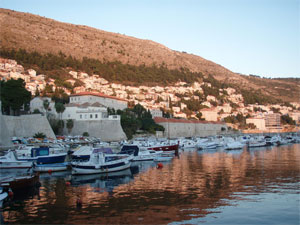An Empty Country
By Lindsay Kuhlmann
 After a day
spent
in bed sick I was
finally able to join my fellow students in the city of Dubrovnik.
Stepping off the ship I was stunned by Croatia’s
beauty. The ocean was twinkling from the sun and sailboats danced on
its
surface. The atmosphere was right out of a romance novel with little
cafes at
every corner and couples having drinks at outdoor pubs. The old city of
Dubrovnik
is a walled city with pristine cobble streets and white buildings. The
romantic
atmosphere increases ten fold when one enters the old city. Pigeons
seem
strategically located in squares dominated by church steeples. Yet with
this
entire romantic atmosphere a dark past dominates Croatia
and the city of Dubrovnik.
I felt
this past within the emptiness of the city. After a day
spent
in bed sick I was
finally able to join my fellow students in the city of Dubrovnik.
Stepping off the ship I was stunned by Croatia’s
beauty. The ocean was twinkling from the sun and sailboats danced on
its
surface. The atmosphere was right out of a romance novel with little
cafes at
every corner and couples having drinks at outdoor pubs. The old city of
Dubrovnik
is a walled city with pristine cobble streets and white buildings. The
romantic
atmosphere increases ten fold when one enters the old city. Pigeons
seem
strategically located in squares dominated by church steeples. Yet with
this
entire romantic atmosphere a dark past dominates Croatia
and the city of Dubrovnik.
I felt
this past within the emptiness of the city. 
While Dubrovnik
seems a
perfect Croatian
town there is a part that is missing. This main ingredient is the
townspeople.
The streets were empty, it seemed, besides Semester at Sea students,
and
shops
were closed for the off season. It appeared that this perfect walled
city was
made for tourists and once these tourists took the season off so did
the town. I
believe that the emptiness is tied to Croatia’s
violent past.
Before
arriving to Croatia,
I studied the war that it was involved in during the early 1990’s. I
expected
to see a country rebuilding itself from a devastating war. Yet the only
hint of
it’s past was found in its lack of people. In “Fear, Death, and
Resistance” the
authors study the displaced citizens of Croatia.
The article describes how people displaced saved
photographs of
their homes and brought them with them to displacement camps. For many
these
homes were burned to the ground and looted of belongings. Yet still
these people
keep detailed lists of where and what their homes used to be. The
article
explains that the photographs represent the need
that these people have to show that they came from
somewhere.
Knowing
the information presented in “Fear, Death, and Resistance” I was easily
able to
notice the discrete effect of the war of Dubrovnik.
While at first I was amazed at how such a beautiful place could be so
empty I
reflected back on the fact that most likely it was not empty by choice.
As I
stayed in a beach house with eight of my friends I couldn’t help
but think
perhaps a picture of this house was among someone’s reminders of the
past. Thus
despite the fact that at first glance Croatia is not war torn, at
second,
one can
see war's effects in its emptiness. While Croatia
has unlimited beauty it also seems to have unlimited sorrow in its
war-torn
past.
|

 After a day
spent
in bed sick I was
finally able to join my fellow students in the city of
After a day
spent
in bed sick I was
finally able to join my fellow students in the city of 